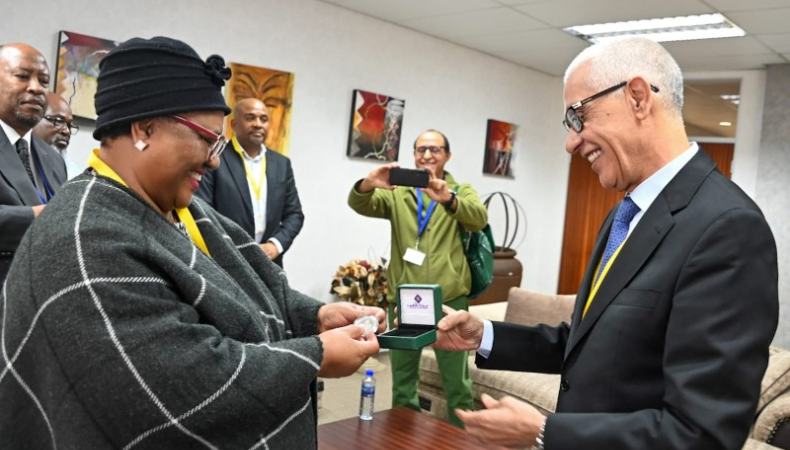Morocco and South Africa Take Steps Toward Strengthening Bilateral Relations

Morocco and South Africa, two of Africa’s most strong nations, have already begun a bright road toward enhancing diplomatic and commercial ties after signing the promise for future collaboration. On October 7, 2024 Moroccan Foreign Minister Nasser Bourita visited Rabat with a South African team headed by a Member of Parliament and Deputy Chairman of the African National Congress (ANC) party’s International Relations Committee. Reflecting the growing realization of the need for deeper cooperation between Morocco and South Africa, this meeting was a turning point in African diplomacy.
Cooperation in Finance Above all, Bapela stressed during the negotiations the need of enhancing commercial and economic ties between Morocco and South Africa, noting that such collaboration may open new growth prospects for both countries. Working together will benefit South Africa—with its wealth of natural resources and industrial capability—as well as Morocco, a rising player in North Africa’s manufacturing and trade sectors. Bapela asked Moroccan companies to give South Africa some consideration for investments using the opportunity to invite them. His invitation highlighted the possibilities of developing a robust economic partnership capable of generating jobs, attracting capital, and so strengthening the economies of both nations.
This discussion reveals a common desire to correct the underdevelopment of economic relations between the two nations in line with their capacity. Morocco and South Africa can present themselves as important players in intra-African commerce by enhancing trade and investments, thereby positioning themselves in line with the African Continental Free commerce Area (AfCFTA) framework, which is supposed to foster regional economic integration. More business exchanges will enable both countries to benefit from which more regional stability and development could follow.
Moroccan Reiteration of African Union Membership: Multilateral Prospect
Bapela expressed support for Morocco’s multilateral readmission to the African Union (AU) since he saw it as a necessary move creating chances for further regional cooperation on challenges. After a 33-year break, this return in 2017 offers opportunities for both nations to engage closer under the AU framework. Bapela pointed out that their combined AU participation presents a chance for coordinated responses to address common African issues like poverty, security threats, economic inequality, and regional instability. Both Morocco and South Africa have leadership roles inside the AU; by harmonizing their policies, they might drive notable advancement on pressing problems facing the continent.
The emphasis on multilateral cooperation highlights Morocco’s and South Africa’s opportunities for participating in world forums. Pursuing diplomatic leadership in Africa, both nations might influence decisions on global policy on climate change, sustainable development, and economic resilience. Working together, they may raise Africa’s prominence in world governance and help to design policies reflecting the needs and interests of the continent.
Earlier diplomatic contacts smoothing the road
The most recent of a series of diplomatic exchanges between Moroccan and South African officials, this encounter between Bourita and Bapela reflects growing political and commercial ties. On September 20, 2024, Moroccan Speaker of the House of Representatives Rachid Talbi Alami traveled to Johannesburg with South African National Assembly Speaker Angela Thokozile. Emphasizing problems like political alignment, economic cooperation, and cultural partnerships, this earlier conference laid the groundwork for later diplomatic exchanges.
These high-level diplomatic projects reflect a desire from both sides to enhance relations and transcend past political conflicts, which have sometimes hampered closer cooperation. As they keep engaging, Morocco and South Africa seem committed to establish a stronger strategic relationship that might have long-lasting consequences for African diplomacy and regional development.
Still Issues: Polisario Front Concern
Although there are bright future possibilities, some problems could sour Morocco-South Africa relations. Among the most significant challenges is the ANC’s posture, which notably hailed the October 4, 2024, ruling of the European Union Court of Justice in favor of the Polisario Front. Morocco claims Western Sahara as its sovereign territory; the Polisario Front seeks autonomy for that area. Historically backing the Polisario Front, South Africa’s position potentially lead to conflict as the two nations aimed to improve their bilateral ties.
Considered as a major victory for the Polisario Front, the Court of Justice ruling of the European Union further complicates Morocco’s diplomatic landscape since it remains claiming Western Sahara. The ANC’s happiness over the choice suggests that South Africa would remain strong in its support of the Front, thereby perhaps hindering more political cooperation between the two nations. These disputes draw attention to the intricacy of the relationship, particularly in situations when attempts to deepen economic ties intersect with political and territorial issues.
Looking forward, cooperation seems to have a straight road ahead.
Notwithstanding the challenges, Morocco’s and South Africa’s communication indicates an encouraging trend. The meeting of Bourita and Bapela as well as earlier exchanges among high-ranking officials show that both nations give growing development of their relationship great attention. Emphasizing economic cooperation, business opportunities, and mutual involvement in the African Union gives a strong framework for continuous cooperation.
Should Morocco and South Africa negotiate the political difficulties around Western Sahara and create common ground, they stand to benefit from a deeper cooperation. Particularly in the framework of a quickly changing global economy where African countries are attempting to establish their influence and build strong, sustainable economies, the prospect for more trade, investment, and regional cooperation is notable.
The road ahead may not be easy given the long-standing political differences, but certainly progress is sought. As Morocco and South Africa continue to communicate, hope is that they will grow closer and more cooperative, therefore benefiting not only their respective countries but also the African continent overall. Through consistent diplomatic efforts, both nations might become key partners in advancing African development and addressing most pressing problems on the continent.




